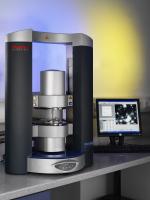Similar to any other material, the properties of polymeric materials are closely linked to their chemical nature
What makes polymers so different from low-molecular-weight substances is the huge influence of their molecular weight (MW) and their molecular weight distribution (MWD) on their macroscopic behaviour. Without changing its chemical nature, we can e.g. “select“ the rigidity or elasticity of a polymeric material just by varying the parameters of the polymerisation process.
Thus, to make a polymer with the desired properties we have to be able to quickly determine the right moment to stop the polymerisation process in order to always get the same MW and MWD. Also, these two parameters can be used to decide whether materials delivered meet the specifications or not.
One widely accepted method makes use of the fact that the crossover frequency determined with a frequency sweep (see Figure 1) depends on the MW of a polymer, whereas the crossover modulus is related to its MWD.
From the crossover modulus the polydispersityindex (PI) can easily be calculated: PI = 100.000/Crossover Modulus
The HAAKE MARS is a high-end rheometer, which has a number of important advantages for polymer analysis. Amongst them is the sensitive normal force sensor, which allows the measurement of forces down to 0.01 N. In combination with the precise lift control this is a great tool to ensure the reproducible loading and axial relaxation of samples. Another unique feature of the HAAKE MARS is the Controlled- Environment-Chamber (CTC). Its powerful combination of convection and radiation heating guarantees the quick adjustment of temperature and low temperature gradients in the sample.
A full copy of this paper is available on request by quoting V-237

